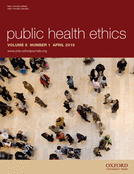-
Views
-
Cite
Cite
Angus Dawson, Marcel Verweij, Public Health: Beyond the Role of the State, Public Health Ethics, Volume 8, Issue 1, April 2015, Pages 1–3, https://doi.org/10.1093/phe/phv002
Close - Share Icon Share
Extract
Most of the papers in this issue of Public Health Ethics—more generally a large part of academic work in our field—are concerned with ethical problems of disease prevention and health promotion activities within nation states. Such discussions often involve reflection on the exact obligations of governments and public health officials acting on behalf of the state while pursuing these ends. In liberal approaches to such discussions, it is common to see a minimal role for the state and a focus on promoting the freedom and responsibility of individual citizens. Indeed, some choose to see public health ethics as being centrally about the conflict between individuals and the state (Holland, 2007; Nuffield Council on Bioethics 2007; Krebs 2008). In various places we have argued that public health ethics should not be conceptualized as being centred on conflicts between individual liberty and the responsibility of the state to protect health (Dawson 2010; Dawson 2011; Verweij & Dawson 2013, Verweij 2014). In this editorial, we suggest that we can see another problem that arises from the individual-vs-state way of structuring such discussions. Public health as an activity goes beyond the role of the state.



